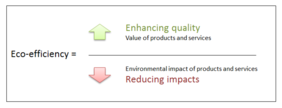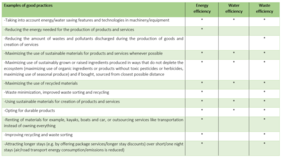What is eco-efficiency in tourism?
Ecological efficiency (eco-efficiency) in tourism means using as small material and energy inputs as possible in maximizing the final result of a product or activity. In simple words, an eco-friendly tourism business tries to maximize the use of small material and energy inputs as possible for the final output of its products and services.
What relation is eco-efficiency to tourism product and service provisions?
Using small material and energy inputs as possible in products-services’ provisions enhances long-term economic and environmental sustainability of product and service providers, as well as destinations. A tourism product or service provider that strives to maximize eco-efficiency in all its product-service provisions can be termed eco-friendly.
How can a tourism product or service provider boost its eco-efficiency?
Eco-efficiency can be enhanced by reducing the amount of energy and natural resources used, as well as wastes and pollutants discharged during the production of goods and creation of services.
Is eco-efficiency achievable? Examples From North Karelia SHA, Finland
Example 1: Incorporating eco-efficiency aspects within Company policy
Äksyt Ämmät is a tourism company located within the North Karelia Biosphere Reserve. The company’s policy is to offer tourists unique experiences in the Finnish nature with samples of Karelian culture and cuisine without compromising the nature on which its activities depend. This is done through networking and collaboration with other local product and service providers, over trying to do everything solely at its premises. The tourists using the company’s services stay in small, family-run guesthouses, eat in local restaurants, and maximize the use of local transport and other tourism services. The restaurants and catering companies providing their services also commit to maximizing use of local ingredients.
Äksyt Ämmät also includes half or full board packages in its tours for three reasons; to reduce pollution and littering, increase convenience of tourists, as well as to promote local culinary culture. The objective of this cooperation is to enhance sustainable tourism in the region. The company also undertakes 100 percent flight compensation for all its international tourists. The company has received various sustainability awards.
Example 2: Internalizing eco-efficiency as a concept from building through to the distant future
Environmentally friendliness for GreenStar is an attitude that was thought from the very beginning of the planning the hotel concept from building process, all the way to the last use building in the distant future. Most of the work done at GreenStar is under the surface; from details in the room, ease of maintenance of the building, building controls joined with reservation, layout and durable materials as only but few examples. The hotel also uses renewable energy and that does not increase net carbon emissions. For example, GreenStar has been innovative in energy efficiency, water efficiency, maximization of sustainable materials, and waste minimization and recycling. This has differentiated the hotel not only an innovative, but also sustainability focused target in the region.
GreenStar has received the UNESCO MAB -program (Man & Biosphere) partnership from North Karelia BR. It has also in possession the Nordic Ecolabel certification, Tripadvisor Greenleader certification received in 2016, among other sustainability awards; one being the Energy Globe Award. The company has a second hotel building with similar concept already open and running. The company hopes to expand its activities on the basis of eco-efficiency from planning to end-use; meaning taking into account water, energy, and waste efficiency throughout its value chain.
Read more: GreenStar: www.greenstar.fi/en/Green
Äksyt Ämmät: www.aksytammat.fi/en/aksyt-ammat/



